Being a pre-medicine student is really difficult, people who are pre-med know that, people who aren’t pre-med know that. Before I came abroad I really felt the burn out hitting me, which was my own fault because I took a full semester of exclusively really difficult science classes. I will never forget the time I failed my genetics test so hard that I had to drop the class because it was my 5th exam of the week after physics II, organic chem II, biochem I and multivariable calculus exams. Yeah, I really didn’t think that one through.
It was humiliating and humbling, and it also made me realize how jaded I was becoming towards science and how burnt out I was at only the half way point to my undergraduate career. Studying the theory before applying it is a necessary evil, but that is a long time coming for those of us that want to be doctors.
I try my very best to find doctors to shadow in the States because it helps me remind myself what I’m working towards and how much I enjoy medicine. I also do my best to try to get to as many clinical skills sessions at OU-Tulsa community medicine so that I can do something more hands on.
One of the best parts about being abroad and doing MPP at DIS has been how hands on I’ve gotten to be with my learning and with our clinical skills. We’ve done a number of workshops and sessions that have allowed us to flex our clinical muscles and it’s widely accepted by my peers that it’s refreshing to be able to play doctor, and to remind ourselves why were slogging through all the theory based, tear inducing learning.
Here’s a look into what I’ve (informally) learned to do at DIS by playing doctor.
Lumbar Puncture
Lumbar puncture was taught by one of the professor of my MPP course. Having talked about meningitis so much, it was awesome to get to actually try it. Of course, the doctors make it seem so easy, but most of us were cringing the entire time thinking of having this super long needle inserted into our backs. There’s also a lot of uncertainty: is the resistance you’re hitting just enough to be the ligament or is it bone? Case in point, Julia bent the needle several times because we told her that the “hard” thing she was hitting was just ligament but it was definitely bone. Sorry, fake volunteer.
Sutures
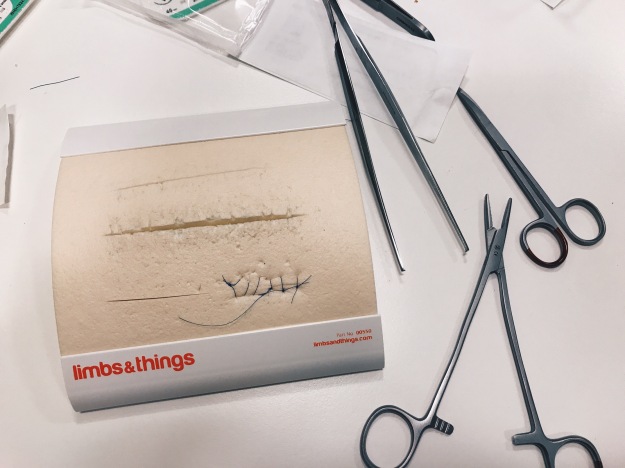
Limbs & Things is quite possibly the cutest name
I really love suturing. I want to do surgery, and being able to use my hands is something that I really treasure. It’s probably why I like to write and practice my calligraphy. Suturing is a great thing to practice, and we’ve done it a couple times this semester. In Vienna we even got to do it on pigs feet!
Catheter Insertion
IV Insertion
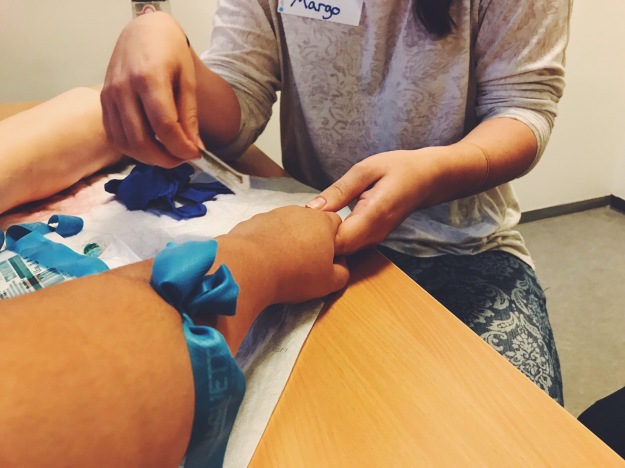
I was brave and I let Margo try to insert one on the back of my hand
Along with suturing, and the catheter insertion, we did IV insertion as part of our clinical skills session. The fake arm we did it on is the cover photo for this blog post, but he allowed us to try it on each other. Margo and I were supposed to try it on each other but I never got a chance to. These are real life skills y’all.
Emergency Medicine
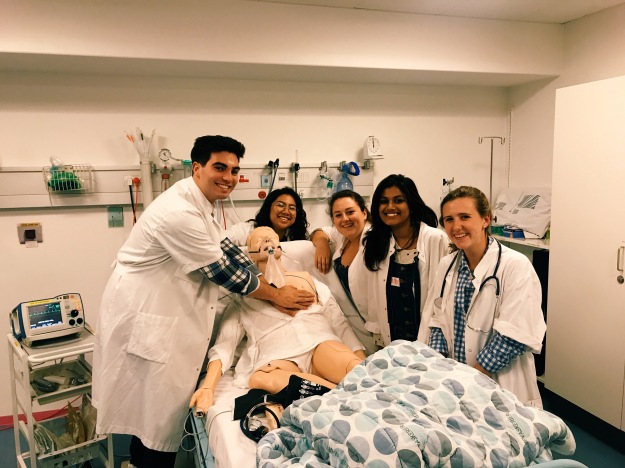
My team!!
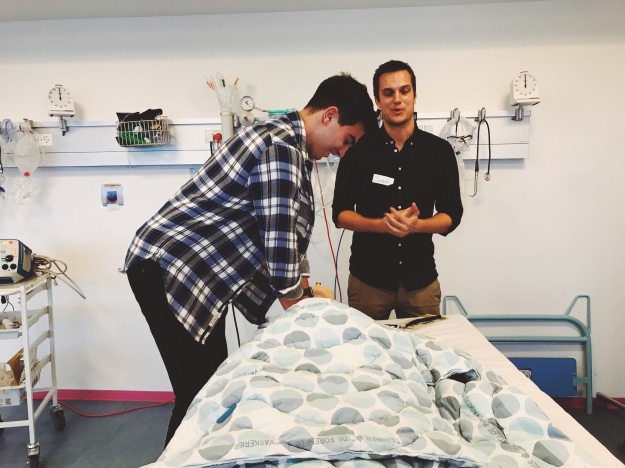
Alex performing CPR
In another one of our sessions, we did an emergency medicine simulation. We did the ABCDE method on a patient that is alive, in the sense that their heart is beating. It’s used in the acute setting in the hospital, and we managed to get Judy who was puking blood out of a life threatening blood pressure drop.
We also had one simulation in which our patient had chest pain and suddenly went into cardiac arrest. In what was not the best of moments, there was at least 30 seconds of complete panicked doing nothing, but once we got going into the CPR and defibrillating, things got going, this time without all the Office references.
OB-GYN Procedures
During our OB-GYN lecture we were able to simulate a pelvic exam, assisting birth, and the insertion of an IUD. It was a unique experience, because it was so different. Most of the time when you do medical simulations it is something like suturing or needles, which is fun, don’t get me wrong, but part of the experience is learning to see medicine from many angles.
Where do we go from here?
These are just the things I’ve seen in my core course. I have another class that has a heavy clinical aspect to it: Complexity of Cancer, where we will be visiting the department of radiology at a local hospital soon.
As a pre-medicine student, it’s important to seek out experiences that remind you of why you’re doing what you’re doing, as well as giving you the opportunity to reflect on if this is really what you want to do. Medicine is a huge, life long commitment, and this class has made me eager to continue to take it on, but it’s also made me realize that I need to take breaks in between.
Not having all of my science classes is weird but a welcome change of pace. Last semester reminded me that I really need to learn how to slow down, and that it’s O K A Y to slow down. Being abroad has allowed me to be more confident and independent, which has in turn given me the boost I needed to make a really big decision: taking a gap year.
The phrase gap year makes the hair on a lot of pre-medical students neck stand up, but here I have yet to speak to a doctor who didn’t take at least a couple. Obviously the financial security in Denmark is a huge contributing factor, but I’ve begun planning how I will make it work and how I can take some much needed time to myself before I try to make the plunge into medicine.
To all the pre-meds reading this: please make sure to make time for yourself. You don’t have to take a gap year, but don’t forget to learn and grow outside of academia, as well as in other realms within it. Also make an effort to engage yourself within the world of medicine if you know it’s what you really want. It’ll help keep you from burning out.
Wish you were here,
Rigel





























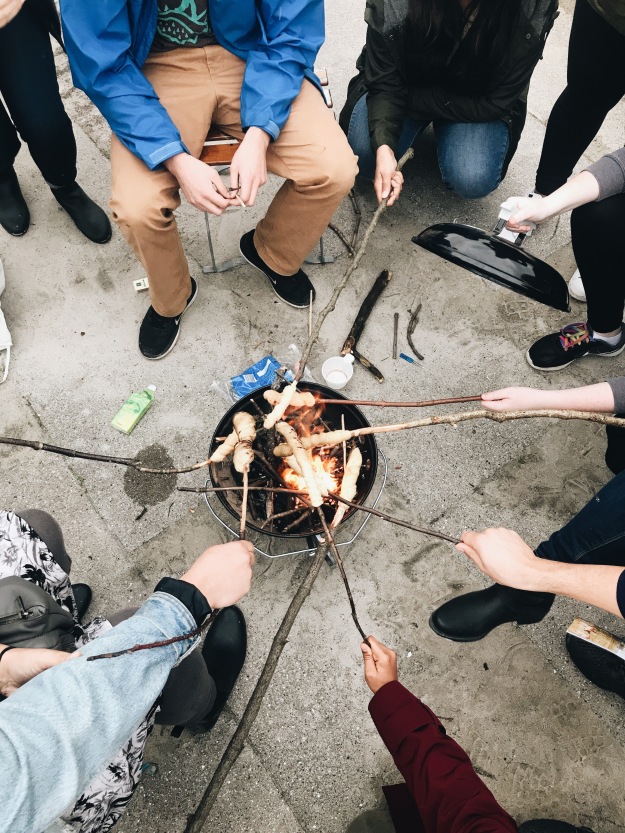
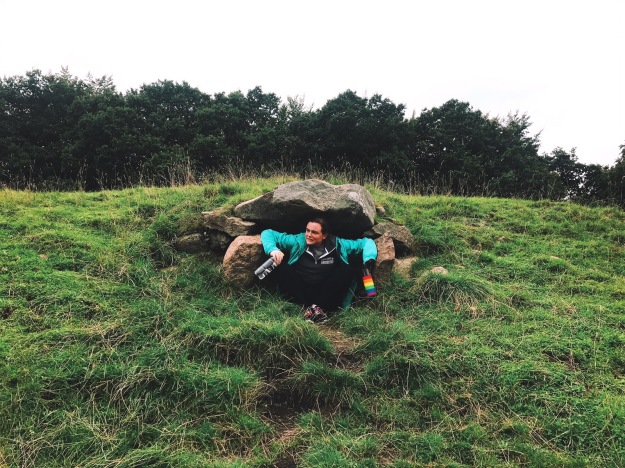





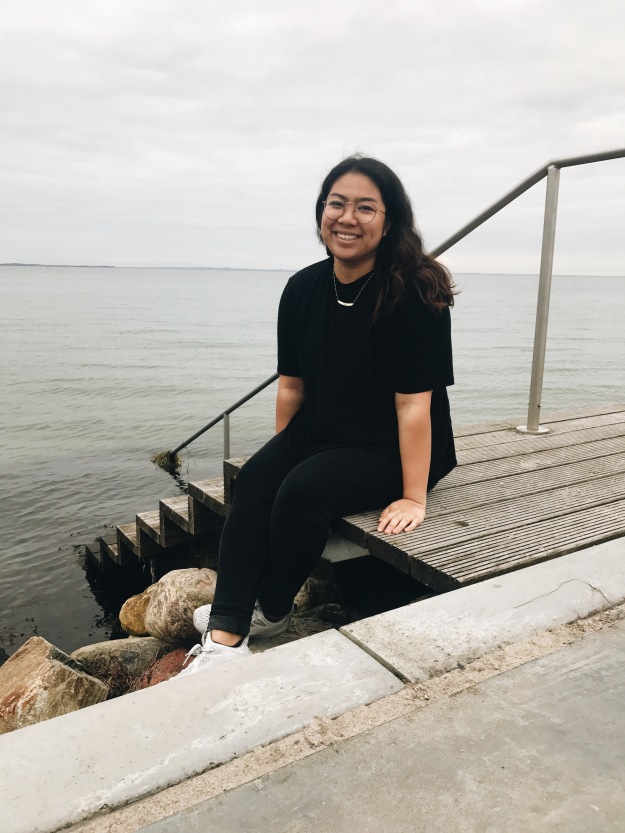











 I can see how the use of the spaces around the city make this such an accessible sport, especially to those who may not be able to afford a gym membership or maybe even basketballs and footballs. It’s an ode to the holistic mindset that the Danes take towards their health and well being. Our instructor taught us not only the physical challenges that come with parkour, he also taught us about how much it also challenges your mind. You must always be thinking of where your feet and your hands will go. How will slight shifts and mere inches change your course of action? It provides an outlet for creativity too, as one person doesn’t have to get from point A to point B in the same manner.
I can see how the use of the spaces around the city make this such an accessible sport, especially to those who may not be able to afford a gym membership or maybe even basketballs and footballs. It’s an ode to the holistic mindset that the Danes take towards their health and well being. Our instructor taught us not only the physical challenges that come with parkour, he also taught us about how much it also challenges your mind. You must always be thinking of where your feet and your hands will go. How will slight shifts and mere inches change your course of action? It provides an outlet for creativity too, as one person doesn’t have to get from point A to point B in the same manner.


